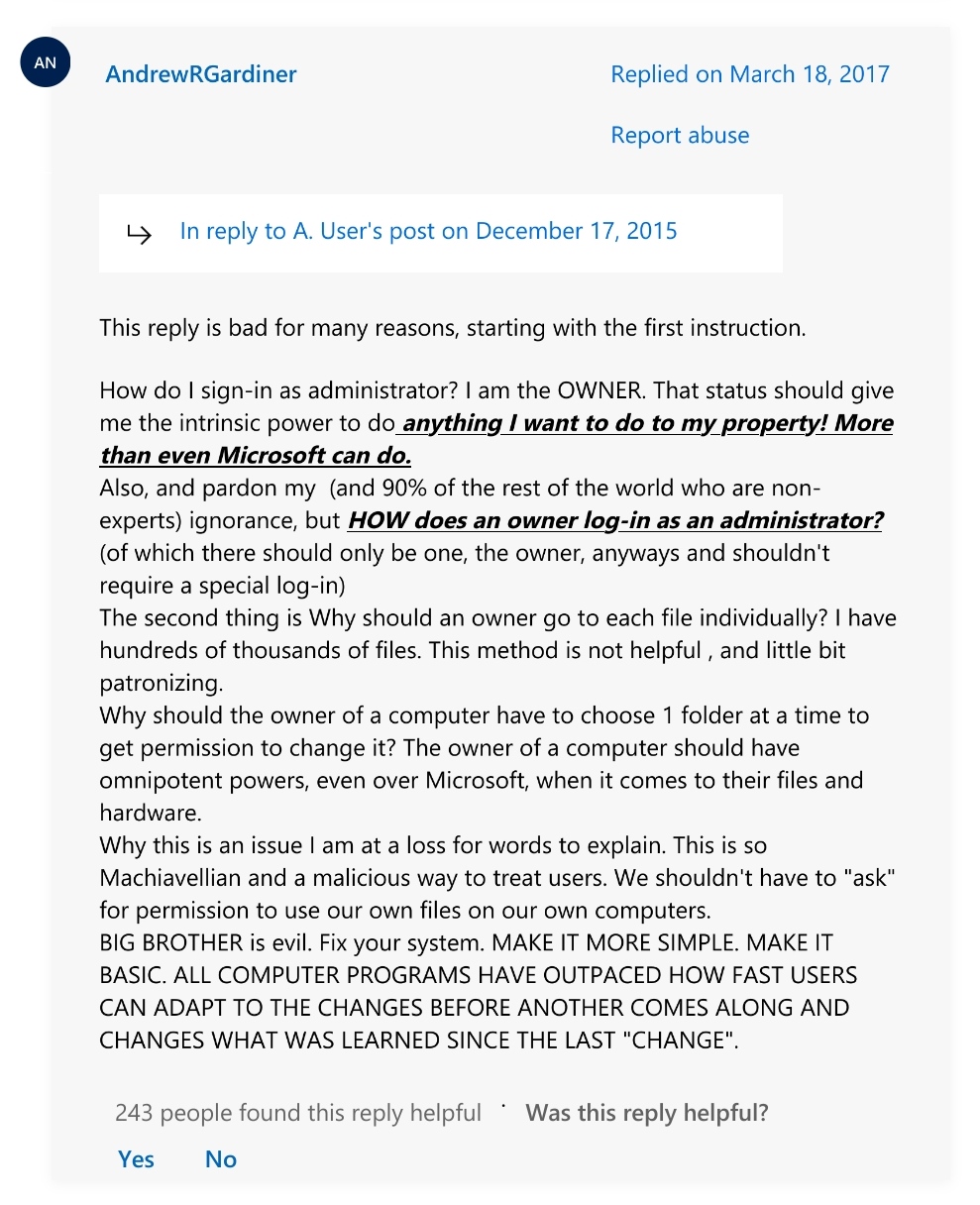bro has never heard of a computer owned by more than one person
Programmer Humor
Post funny things about programming here! (Or just rant about your favourite programming language.)
Rules:
- Posts must be relevant to programming, programmers, or computer science.
- No NSFW content.
- Jokes must be in good taste. No hate speech, bigotry, etc.
Pebkac. Gui equivalent of chown perfectly working on windows and supports recursing into directories. If the questioner doesn't know how to login as an admin they miss some absolute basic computer usage knowledge, and a general help forum thread wont help them.
Not to mention there is no admin anymore, it's essentially a sudo style with it popping up asking are you sure.
This though really reeks of their son dragged and dropped their old files onto a new computer and didn't set the NTFS permissions, and purposely set them up as a non admin so they wouldn't bother them with "I got a new virus". When I have an elderly relative ask for me to set up their computer I don't give them admin rights
Oh! I know! Andrew wants Windows 95. But then he won't be able to post questions on the Internet any more 😔 .
Is this real? Are people having to request permission changes on files by petitioning microsoft to change their permissions?
I'm a sysadmin and I work with Windows a lot.
The short version is that only the users granted permission to a given set of files can access those files. With NTFS permissions it's... Complicated. You can have explicit permission to a file, or implied permission via a group that you're a part of, or some combination of those things. You can also have read, but no write. You can have append but not create, you can have delete, but not list. It's a lot of very granular, very crazy permissions.
There's also deny permissions which overrule everything.
What has likely happened is that the posters user account doesn't have implied or explicit permission to the file, but if you sign in as an administrator, even if the administrator doesn't have permission to read/write/append/delete the file, the administrator has permission to take ownership of a file, and as owner, change the permissions of a file. Being owner doesn't mean you can open/read/write/append/delete anything, you can just change permissions and give yourself (or anyone else) permissions to the file.
Changing ownership is a right which, as far as I'm aware, cannot be revoked from admin level users. They can always change ownership. Owners of files cannot be denied the right to change the permissions of a file as far as I know. This will always result in some method by which administrative level accounts can recover access to files and folders.
In my experience, exceptions exist but are extremely rare (usually to do with kernel level stuff, and/or lockouts by security/AV software).
The poster might legally and physically own the device and all the data contained therein, and may have an administrative level account on that device, but the fact is, their NTFS permissions are not set to allow them access to the data. The post they're replying to is trying to let them know how to fix it by using an administrative level account and they're not tech-savvy enough to follow along.
I don't blame them. File permissions issues are challenging even for me, and I fully understand the problem.
Did I do something odd when I set up my windows 11 machine?
If Microsoft has something marked as admin access, it just presents me with a dialogue asking if I want to do whatever as admin
I mean it's not like I have open hardware so there's a whole lot of my machine I really have no practical access to, but everything this guy wants is there
Him saying he's the owner suggests a private machine, so no corporate lockout from system components. Do computer shops set up admin accounts and lock their customers out as low-privileged users?
